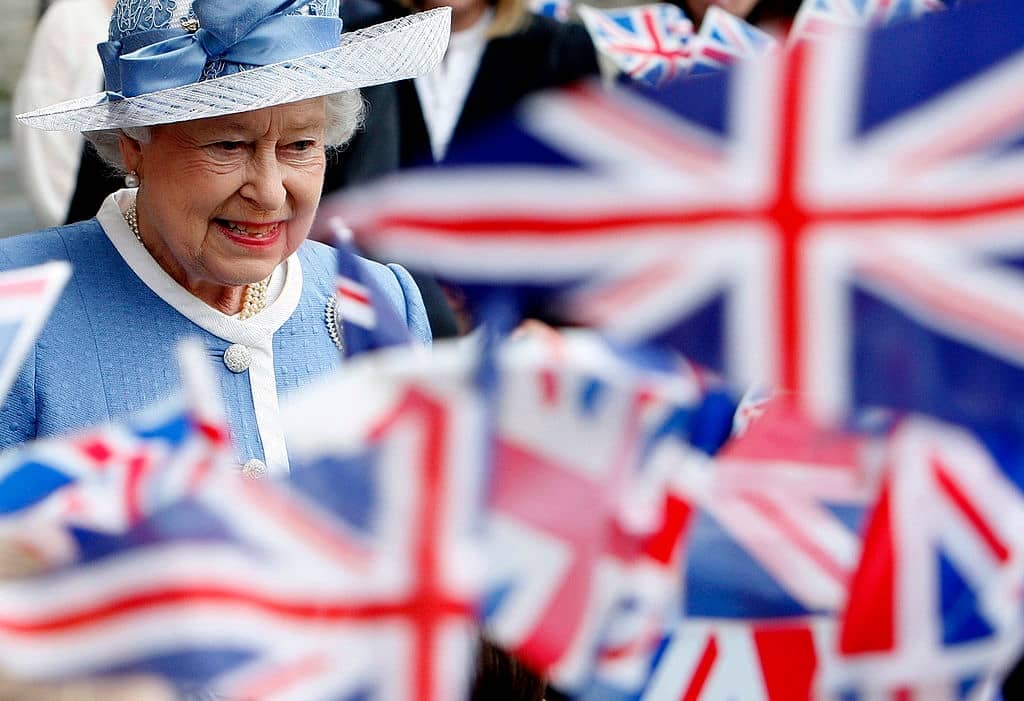‘The people of England were long habituated to queues; some had joined the procession ignorant of its end – hoping perhaps for cigarettes or shoes – but most were in a mood of devotion.’ In Unconditional Surrender, his novel of the Second World War, Evelyn Waugh describes the queue to see ‘the Sword of Stalingrad’, wrought of silver, gold and Sheffield steel, which was displayed in Westminster Abbey in 1943 before it was presented by Churchill to Stalin in honour of the Russian people’s resistance to Hitler.
Here, wrote Waugh, in ‘the sacring place of the Kings of England’, the sword stood for the timeless and transcendent against the grossly modern, for old skills and old virtues in an age of mechanised war. But for his hero Guy Crouchback the partnership with Moscow tarnished the cause for which he had enlisted. He had been happier when Russia and Germany were allies: ‘the enemy at last was in plain view,’ he thought at the time of the Molotov-Ribbentrop pact: ‘it was the Modern Age in arms’. The Sword of Stalingrad, standing ‘on a table counterfeiting an altar’, honoured a dishonourable alliance, and now it didn’t really matter to him who won the war.
No such ambivalence, such opportunities for cynicism, attended the queue to see the Queen’s coffin on its catafalque, or the cortege passing through West London to Windsor. Here the devotion was justified and uncomplicated. The people paid homage to the memory of a woman who by her example made us better versions of ourselves, and even in her death, as in her life, worked to unite the people of these islands.
Our politics has already begun a course correction
As in 1943 there is also, surely, a sense that the spectacle the UK is laying on transcends the time. The royal rituals, the TV documentaries and the special colour supplements connect us with a purer thing, and offer a mental escape from a time of global danger and domestic anxiety. More profoundly, however, and I hope more permanently, this time of mourning and what the BBC calls ‘national reflection’ is offering us a path back to a decent British patriotism.
Every Western country has had its politics transformed by the long effects of deindustrialisation, globalisation and automation. The end of traditional jobs has hollowed out communities and created a crisis of purpose and identity in individuals and, consequently, in the nation. What are we for? What do we do? Who are we?
In response a polarity emerges, between those who embrace the changes underway and those who resist them. The West is divided between anti-nationalists and ultra-nationalists, between those who pursue a globalist agenda of open borders, historical revision and cultural progressivism, and those who double down on the native loyalties, the emblems and the exclusions of the past.
Western establishments in recent decades have sided with the anti-nationalist tendency. This has fed Crouchback’s suspicion that national honour has been tarnished by bad allegiances, by the wrong response to the Modern Age. For decades the state and cultural elite have been at odds with the nation, allied with global forces antipathetic to the values of ordinary people. And ordinary people don’t like it.
Other countries – France and America especially – experience this political polarity more sharply than us. One reason is an electoral system in Britain that rewards parties who seek the centre ground. Another, more potent perhaps, is monarchy. We have at the apex of our establishment an indubitably nationalist institution. The Queen herself stood for every British virtue, too hackneyed to list, and in her obsequies the British state and its offshoots – Parliament and the BBC most obviously – have unashamedly cheered a form of government that is both ancient and particular.
This is not an ultra-nationalist moment. The patriotism the Queen represented and which was silently echoed back by the crowds who queued to bow before her coffin is not the Blimpish sort. The monarchy of Queen Elizabeth and the Duke of Edinburgh was one with a confidently global outlook and a cheerful interest in the future. In her attachment to the Union and to the Commonwealth the Queen implicitly rebuked the impulse to Little Englandism.
Our politics has already begun a course correction. The state, represented in Boris Johnson and Liz Truss and also in Keir Starmer’s efforts to realign his party with the patriotic Labour tradition, is reconnecting with the nation. As the politicians sit today in ‘the sacring place of the Kings of England’ to bid farewell to our late great Queen, we can reflect on what may be her greatest legacy: a revived patriotism, as tough, decent, gentle and honest as she was.






Comments